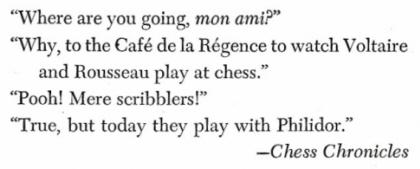
Edward Winter
From a letter written by Frederick M. Edge to Daniel Fiske dated 7 November 1859:
‘History neither lies nor forgets. Nobody could chronicle Paul Morphy’s feats in future ages without giving me my due. All French and English players know this, and the Germans, too, through Anderssen and Mayet. Besides, I shall at some future time through my own individual exertions reflect glory upon Morphy, and what I say will be received as authoritative. It will not always be “Edge, Morphy’s friend”, but “Morphy, Edge’s”. Voltaire was enthroned by Frederick of Prussia; he was Voltaire nevertheless, but Frederick crowned him. Mark my words, Fiske! If not a Virgil in chess, I shall one day be its Maecenas. This only requires these qualifications - energy, wealth, power. The first you know I possess, and the others will be shortly mine. Then, all of you will come and make your peace with me.’
(3396)
For the full text, see Edge Letters to Fiske.
In C.N. 6202 John Roycroft asked whether any reader could shed light on the name Дюсер in a 1924 sonnet by Vladimir Nabokov, the line being ‘Там Филидор сражался и Дюсер’.
Dan Scoones (Port Coquitlam, BC, Canada) has drawn our attention to a Russian webpage where Gennady Nesis proposed two theories. Below is the relevant text, in a translation supplied by Mr Roycroft:
‘The coffee house frequented by Philidor can only be the Parisian Café de la Régence, first opened in 1718 and patronized by chessplayers for two centuries. They included many famous names, such as Voltaire, J.-J. Rousseau, D. Diderot and, later, B. Franklin, M. Robespierre and Napoleon Bonaparte. Among the Russians were I. Turgenev and M. Chigorin. So whom could Nabokov have had in mind?
The first candidate is Sire de Légall (1702-1792), tutor to Philidor, but I have an alternative to propose.
It is known that the future Emperor Paul of Russia and his spouse Maria Fyodorovna paid France an unofficial visit in 1782. To obviate the conventions of protocol, the son of the Empress Ekaterina [name corrected to ‘Ekaterina’, i.e. Catherine the Great, by Mr Roycroft, whose original translation had ‘Elizabeth’] travelled under the pseudonym of Count Severny. We now cite a “Bibliography” published in Paris in 1864: “In the summer of 1782 an unprepossessing gentleman of small stature dropped in to the Régence and stood watching one of the chess contestants. The unknown guest indicated a move he thought was the best and, encountering surprise, made a wager of one louis d’or that he was right. Winning his bet he handed the gold coin to a dumbstruck manservant and departed without a word. Only then did those present guess that the lavish guest was none other than Paul, heir to the Russian throne.”
So why Дюсер? Perhaps the common particle “de” or “du” preceding a name in France indicates a connection at the court, while сер is the initial syllable of “sérénissime” (most serene) or even “Sire” (sovereign).
Be that as it may, our readers may care to rack their brains on this riddle.’
(6259)
Trustworthy writers naturally resist the temptation to repeat unverified material, and especially in a domain such as chess lore which is notoriously infested with imprecision and uncertainty.
From page 220 of Total Chess by David Spanier (London, 1984):
‘I can’t resist repeating that old anecdote about the man going into the café [the Café de la Régence] to watch Voltaire and Rousseau play at chess. Mere scribblers, those two, sniffs an acquaintance. “True, but today they play with Philidor!”’
Information is sought about the tale, which had appeared on page 92 of The World of Chess by A. Saidy and N. Lessing (New York, 1974):

(8866)
See also Jean-Jacques Rousseau and Chess.
Some old references:
The articles in the German, British and Icelandic publications were similar, and the BCM had this introductory note to its translation:
‘The following article is from an old volume of the Leipzig Illustrirte Zeitung. It has been recently republished by the chess editor of Die Bohemia ...’
(9938)
Yasser Seirawan (Hilversum, the Netherlands) notes the following paragraph in an article on correspondence chess by Greg Keener in the New York Times, 9/10 November 2022:
‘Looking back even further, it is believed that King Henry I of England, whose reign lasted from 1100 to 1135 A.D., played correspondence chess with his counterpart in France, King Louis VI, who reigned from 1108 until 1137. The French enlightenment writer and luminary Voltaire is noted to have played correspondence chess with his pupil Frederick the Great of Prussia. Their moves were securely escorted by royal courier between Berlin and Paris. It’s also thought that Venetian merchants played correspondence chess with one another, contemplating their next moves on voyages between ports.’
Such stuff can be found on sourceless sites at the press of a button, but what can be written properly on the topic, without recourse to ‘it is believed that’, ‘is noted to have played’ and ‘it’s also thought that’?
(11924)
See also the reference to Voltaire in Napoleon Bonaparte and Chess.
The most common remark misascribed to Voltaire is:
‘I may not like what you say, but I will defend to the death your right to say it.’
We offer this to characterize the misascribors:
‘I may not have read a line of Voltaire, but I will defend to the death my right to misquote him.’
To the Archives
for other feature articles.
Copyright Edward Winter. All rights reserved.